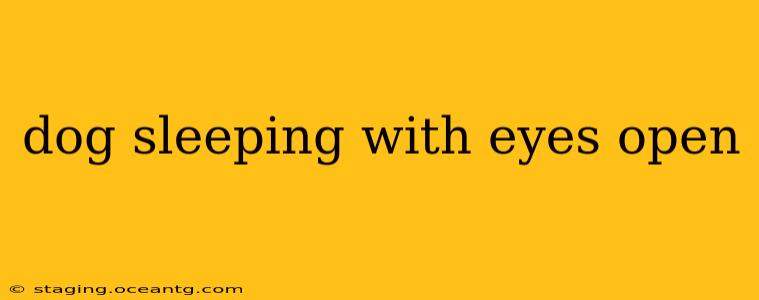Many dog owners have witnessed their furry friends seemingly sleeping with their eyes open. This unusual sight often sparks curiosity and concern. Is your dog really asleep? Are they experiencing some kind of medical issue? Let's delve into the science behind this seemingly strange canine behavior.
Is My Dog Really Asleep If Their Eyes Are Open?
Yes, your dog can be genuinely asleep even with their eyes partially or fully open. Unlike humans, dogs don't always close their eyes completely during sleep. This is due to several factors, primarily related to their unique sleep architecture and the structure of their eyelids. While they might appear awake, a sleeping dog with open eyes will typically exhibit other signs of sleep, such as relaxed muscles, slowed breathing, and a lack of responsiveness to external stimuli.
Why Do Dogs Sleep With Their Eyes Open?
Several reasons explain why your dog might appear to be sleeping with their eyes open:
Incomplete Eyelid Closure:
Dogs' eyelids are structured differently from human eyelids. They lack the same degree of muscle control, resulting in incomplete closure, even during deep sleep. This is particularly true for brachycephalic breeds (dogs with short noses, like Bulldogs and Pugs), who often have more pronounced eye issues.
Light Sleep Stages:
Dogs, like humans, cycle through different sleep stages. During lighter sleep stages, their eyes might remain slightly open, or even flicker, as they transition between sleep and wakefulness. This is normal and shouldn't cause concern unless accompanied by other unusual behaviors.
Muscle Relaxation:
During sleep, a dog's facial muscles relax. This relaxation can affect the eyelids, leading to a partially open or slightly droopy appearance, even if the dog is soundly asleep.
Breed Predisposition:
Certain dog breeds are more prone to sleeping with their eyes open than others. As mentioned, brachycephalic breeds are particularly susceptible due to their unique facial structure.
What If My Dog Is Sleeping With Eyes Open and Acting Strange?
While sleeping with eyes open is often normal, it's crucial to be attentive to any accompanying signs. If your dog exhibits unusual behavior alongside open eyes during sleep, such as:
- Excessive drooling
- Unusual vocalizations
- Restlessness or agitation
- Difficulty breathing
- Seizure-like activity
You should consult a veterinarian immediately. These could be signs of a underlying medical condition requiring professional attention.
My Dog Sleeps With Eyes Open: Is This a Medical Concern?
In most cases, a dog sleeping with its eyes open is not a cause for worry. However, if you observe the warning signs listed above, seek veterinary advice. Conditions like Horner's syndrome or other neurological issues can sometimes manifest as unusual sleep patterns. A vet can perform a thorough examination to rule out any underlying medical problems.
How Can I Tell If My Dog Is Truly Asleep?
To determine if your dog is truly asleep, observe their overall behavior. A sleeping dog will typically exhibit:
- Relaxed posture: Their body will be loose and un-tense.
- Slowed breathing: Their breathing will be deeper and slower than when awake.
- Unresponsiveness: They will be less likely to respond to sounds or touch.
- No rapid eye movement (REM): While dogs do experience REM sleep, it's usually less obvious than in humans.
If your dog displays these characteristics, even with eyes open, they are likely just enjoying a peaceful slumber.
What should I do if my dog sleeps with its eyes open?
Unless you notice other concerning symptoms, there's usually no need to intervene. Ensure your dog has a comfortable and safe sleeping environment. If you're still worried, consult your vet for peace of mind.
In conclusion, while a sleeping dog with open eyes can look alarming, it's often a normal and harmless occurrence. However, observing your dog's overall behavior and seeking veterinary guidance when necessary is crucial to ensure their well-being. Remember, regular vet check-ups are essential for maintaining your canine companion's health.
